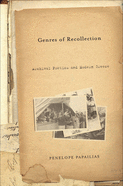Archives and Modern (not, for a change, ancient) Greece

Modern Greece has been a nation described as being poor in its archival programs, ironic given the tradition of ancient archives there. Penelope Papailias, in Genres of Recollection: Archival Poetics and Modern Greece (New York: Palgrave Macmillan, 2005), ISBN 1-4039-6106-9, counters this notion. Papailias examines archiving as a societal function, not as a task associated only with archival programs or archivists. She examines amateurs creating personal and family archives, the efforts by amateur historians, genealogists, and novelists. As Papailias states at the outset of her study, “this book explores the politics of historical representation in Greek society through an ethnography of documentation, archiving, and historical writing” (p. 1).
This is both a complex and interesting book, offering considerable insights into a broader conception of the archival function in society. Papailias provides detailed observations about how the collectors of personal archives, those compiling oral testimonies, and even fiction writers using historial evidence all contribute to an archival sensibility. The author argues, “What these diverse historical producers shared was a sense that they must, both for their own existential well-being and that of some collectivity (Family, local community, ethnic group, social class, nation, humanity), document and preserve accounts of a past that was being forgotten, elided, or actively repressed in public discourse, official history, and/or academic scholarship” (pp. 2-3).
The result is a study that is a rich tapestry of differing approaches to conceiving of archives in society. The author’s command of the literature about the notion of archives is quite good, although predictably, she focuses more on the writings of individuals such as Foucault and Dirreda than on the explorations by archivists themselves (although there are citations to some such as Terry Cook). This is a study that ought to stimulate some new thinking about the archival function in culture, and it is certainly an important contribution to the professional and scholarly literature. Genres of Recollection provides an alternative to the contextual background for the work of archivists and archives, expanding beyond the professionals to others who care for preserving the past.

